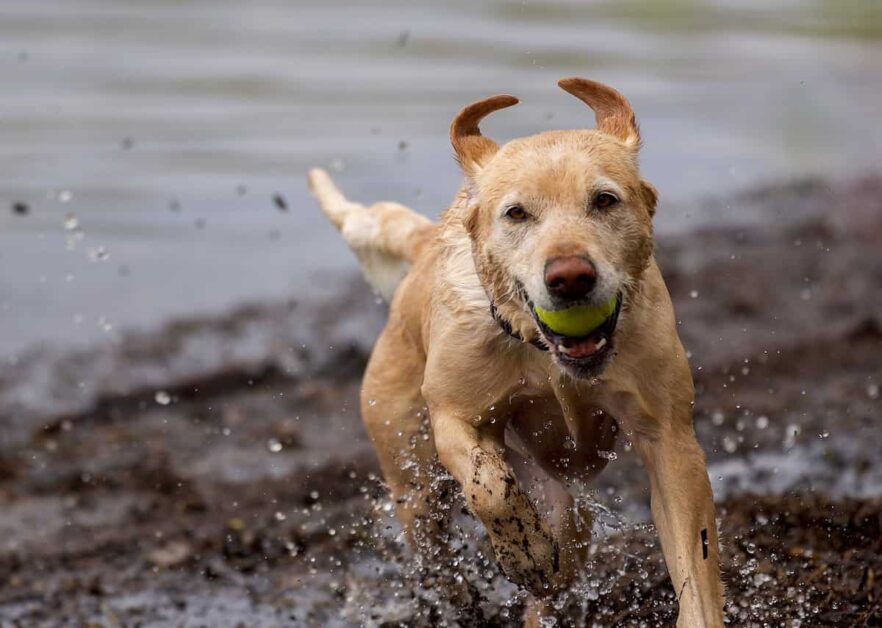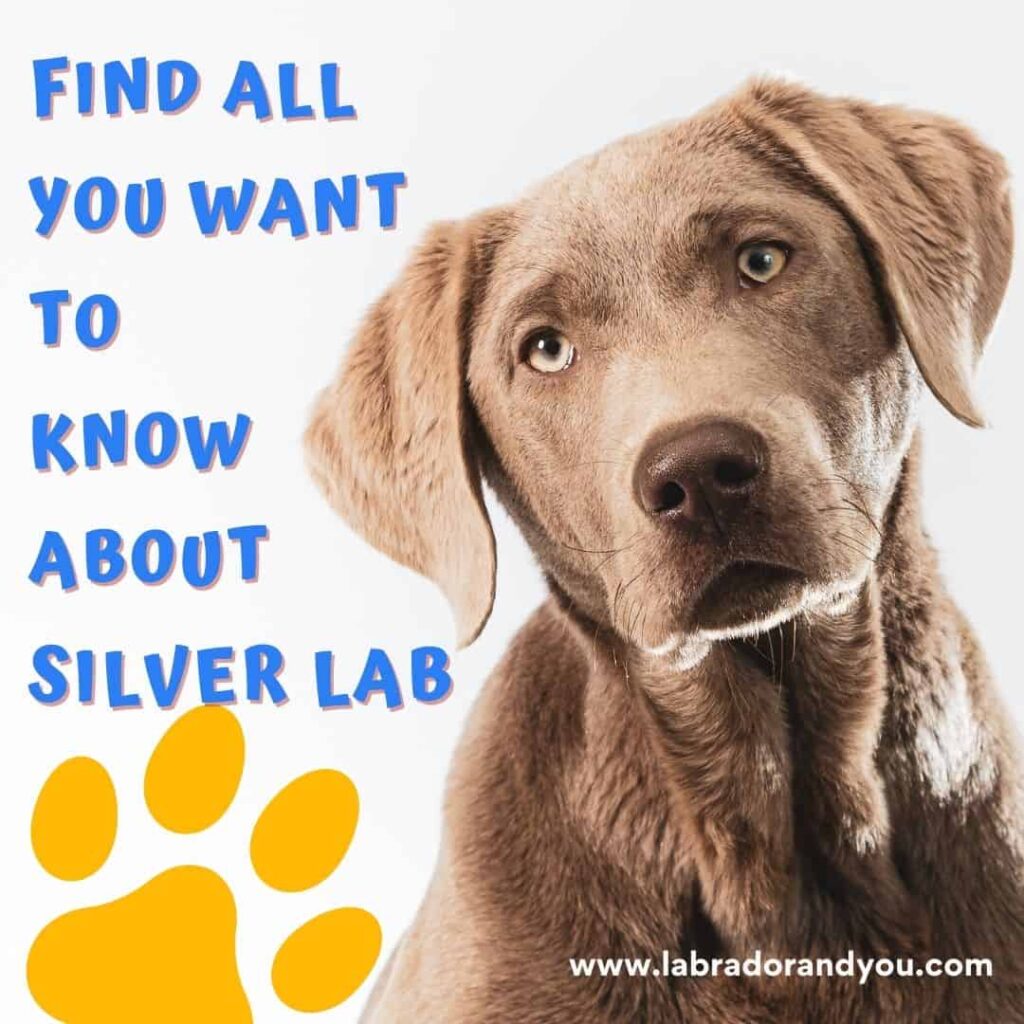A 6-month-old lab puppy has a solid, muscular body, floppy ears, and a short, dense coat that is often yellow, black, or chocolate brown. Energetic and playful, labs at this age love fetching toys and chewing.
Intelligent and friendly, six-month-old lab puppies make devoted companions, though they require ample exercise and training at this excitable stage. They bring joy and laughter into any home.
Size can vary depending on genetics and diet, but rest assured that your young Lab is growing as expected. Training should be ongoing, aiming for solid recall, basic obedience commands, and socialization skills.

Lab Puppy’s growth and development
At six months old, a Labrador puppy has reached half their final adult labrador height and weight, but it will continue to fill out and mature mentally for another year or two. Lab puppies stop growing at around age 2. Check out our weight chart for chocolate lab and other pets here.
The physical Growth rate of a lab puppy
When your Labrador reaches six months old, it will have experienced significant physical growth. It is not uncommon for a 6-month-old Lab to weigh around 50 lbs, at least double its weight at four months old.
However, the growth rate of Labrador puppies starts to slow down after they hit six months. Over the next six months, you can expect them to gain an additional 10-20 lbs as the dog reaches adulthood.
Behavioral Changes of a new puppy
Labrador puppies undergo noticeable behavioral changes at six months as they transition from the puppy phase into adolescence.
These intelligent and eager-to-please dogs become more capable of learning new commands, making it an ideal time to start advanced obedience training such as remote sit, marking drills, and healing. However, remember that this age also increases curiosity and a desire to explore the world around them.
During this developmental period, it is crucial to be patient and consistent with training methods while using positive reinforcement to ensure your Labrador builds strong bonds with you as their owner.
Establishing clear boundaries and expectations early on will help prevent undesirable behaviors such as jumping up or over-excitement during playtime later.
Training Your 6-Month-Old New Puppy
Train your 6-month-old Labrador puppy using positive reinforcement techniques such as collar conditioning and electronic collars, teaching them obedience commands like “come” and “heel,” retrieving skills, and socialization with other dogs.

Obedience Training for Labrador Retriever Puppy
Obedience training is crucial to raising a well-behaved and happy 6-month-old Labrador puppy. Here are some key aspects to consider when implementing obedience training:
- Focus on basic commands: Start by teaching your Lab puppy essential commands such as sit, down, stay, and come.
- Use positive reinforcement: Reward good behavior with treats, praise, or playtime, ensuring the experience is enjoyable for your pup.
- Be consistent: Consistency in using command words and hand signals will help your Labrador learn quickly and effectively.
- Gradually increase difficulty: As your Lab progresses in obedience skills, introduce more advanced commands like leave it and heel position.
- Practice patience: Understand that every dog learns at their own pace; remain patient and keep training sessions short to avoid frustration.
- Socialize your puppy: Exposure to various environments can help improve your Labrador’s obedience in different situations.
- Avoid dominance techniques: Rather than trying to establish yourself as the alpha or pack leader, focus on building trust and understanding between you and your Lab pup.
- Attend obedience classes: Consider enrolling in professional obedience classes for expert guidance tailored to you and your Labrador’s needs.
- Reinforce learned behaviors: Regularly practice the commands your Lab has learned to ensure they become second nature over time.
- Proof against distractions: Once your Labrador has mastered the basics, work on their ability to respond correctly even amidst distractions like other animals or loud noises.
Following these steps during obedience training sessions with a 6-month-old Labrador puppy, you’ll be laying a solid foundation for future success in all areas of life.
Collar Conditioning for chocolate lab
Collar conditioning is an essential step in preparing your six-month-old Labrador puppy for the use of an electronic collar. It involves introducing the dog to a standard flat or adjustable collar they wear at all times, even when not undergoing training sessions.
Once the dog becomes accustomed to wearing a standard collar, you can gradually introduce them to the electronic collar. Positive reinforcement techniques ensure they associate any corrective action taken with specific obedience commands they already know.
Using Electronic Collars Positively As Lab Owners
Electronic collars, also known as e-collars or shock collars, can be useful in training your 6-month-old Labrador puppy if used positively.
Collar conditioning is important to prepare your puppy for using an electronic collar in the future and ensure they have a positive association with it.
E-collars can enforce obedience commands that your puppy already knows, such as “sit” or “stay.” However, it’s crucial to introduce the collar correctly to avoid negative associations.
Positive reinforcement is still necessary when using an e-collar, which means rewarding good behavior instead of punishing bad behavior.
Self-control And Restraint for large dogs
Labrador puppies can be excitable and energetic, making self-control and restraint crucial for their training at six months old. Teaching your puppy to wait patiently and resist impulses will make them more obedient in the long run.
One way to develop self-control is by practicing “leave it” commands with toys or treats.
Another important exercise is teaching steady behavior while marking drills during retrieving practice. Encourage controlled behavior when throwing dummies for your Labrador puppy to retrieve, hopefully avoiding over-excitement when fetching ducks or other games down the road.
Heeling Command
Heeling is an essential obedience command that every 6-month-old Labrador puppy should learn. It involves walking calmly on a leash without pulling or straying from the handler’s side.
Positive reinforcement using treats and praise is an excellent way to teach heeling. Reinforcing good behavior with positive feedback encourages the dog to repeat it.
Consistency in command giving, rewarding only good behavior, and short but frequent training sessions are critical elements of successful heeling training.
Teaching Remote Sit for 6month old lab puppy
Your Labrador puppy can learn remote sit at 6 months old, which is a helpful command for keeping distance between you and your dog. To teach remote sit, first have your puppy sit next to you.
Then take a few steps back while holding out a treat or toy to get their attention. Give the “sit” command while signaling with an open palm facing down towards the ground. If they complete the action from a distance, reward them with praise and give them their treat or toy.
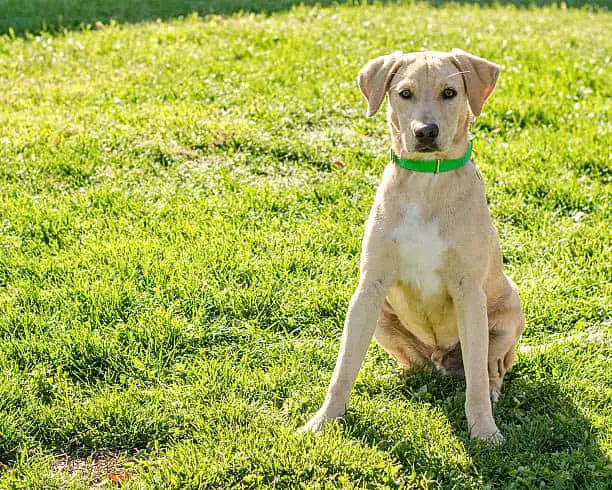
Come Or Here Command for 6 month old lab puppy
The “come” or “here” command is an essential and basic obedience skill that can be taught to six-month-old Labrador puppies. Teaching your puppy to come when called is crucial for their safety inside and outside the house.
You can start by calling your puppy’s name cheerful and rewarding them with treats or praise when they respond positively.
Distractions can be prevalent during training sessions, so starting in a quiet environment before slowly moving onto noisier or outdoor spaces will help improve their response times.
Retrieving Command For Male Lab
Retrieving is an instinct for Labrador puppies, making it an essential part of their training. Teaching your six-month-old Lab to retrieve can be a fun and straightforward process that strengthens your bond with your furry friend.
Begin by selecting small, soft objects like balls or plush toys that are easy for your puppy to carry in its mouth. Use positive reinforcement techniques like praise and treats to encourage your puppy to pick up the object.
Labradors’ natural abilities make them great retrievers; however, proper training is critical to ensure they retrieve properly without damaging items or getting distracted easily.
With patience and consistency over time, retrieving can become one of your six-month-old Lab’s favorite pastimes. It will also keep their minds stimulated and strengthen their muscles as they grow into adulthood.
Marking Drills for Same Breed
Marking drills are essential to training a 6-month-old Labrador puppy, as they help develop their natural retrieving ability. These drills involve throwing a bumper or bird and having the dog retrieve it from around 50 to 60 yards.
The goal is to teach the pup how to mark the object’s fall and retrieve it easily and accurately.
During these drills, trainers should ensure that dogs have plenty of positive reinforcement for marking correctly and promptly returning items. It’s important to introduce steady work early enough in training as this can dampen enthusiasm.
Overall, marking drills as part of your labrador’s training regimen is key to promoting their instincts towards activities like swimming and retrieving.
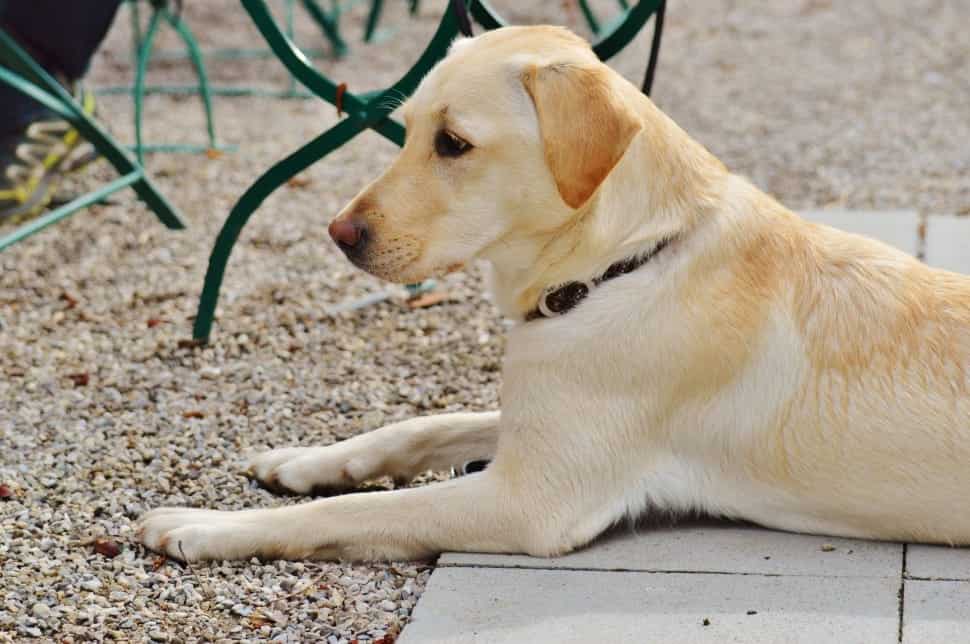
Socializing Your 6-Month-Old Labrador Puppy
Introducing your 6-month-old Labrador puppy to new people and environments is crucial for proper socialization.
Introducing New People And Environments
Socialization is a crucial aspect of raising a 6-month-old Labrador puppy. It involves introducing them to new people and environments. Here are some tips to ensure that the introduction process goes smoothly:
- Start with familiar surroundings such as your home or backyard.
- Gradually introduce new people one at a time, ensuring they approach the puppy calmly and gently.
- Reward positive behavior such as sniffing or tail wagging.
- As your puppy becomes comfortable, gradually introduce new environments, such as dog park or busy streets..
Socialization helps build a strong bond between you and your puppy while teaching important communication and behavioral skills.
Positive Reinforcement For Social Interactions
Positive reinforcement is a crucial aspect of socializing your six-month-old Labrador puppy. You should always reward your furry friend for good behavior, whether they’re meeting new people or interacting with other animals.
Whenever your dog shows friendly behavior towards others, give them verbal praise and treats to encourage positive interactions.
Remember that every interaction should be rewarded for the desired behavior, such as sniffing a hand rather than jumping up on someone or calmly greeting another dog instead of barking aggressively.
Positive reinforcement-based training promotes long-term success and helps build trust in the bond between you and your pup.
Health Care
Ensure your 6-month-old Labrador puppy receives proper nutrition by feeding them high-quality dog food specifically formulated for their age and activity level.
Additionally, they should be able to get enough exercise and attend regular vet check-ups, including vaccinations and preventative measures like flea and tick prevention.
Proper Nutrition And Feeding
Feeding your 6-month-old Labrador puppy a balanced and nutritious diet is crucial to avoid poor health and bad development. As a rule, feeding them three meals daily during this phase of their life is best.
Each meal includes protein, carbohydrates, fats, vitamins, and minerals. Not all dog food is created equal. Feed your Labrador puppy with age-appropriate foods specifically formulated for their breed size and growth stage.
Consult with a veterinarian if you’re unsure which brand or type of food is best for your pup’s needs. Always provide plenty of fresh water.
Hydration is essential in maintaining healthy body functions! Finally, avoid giving table scraps or human food treats as they often contain ingredients that aren’t suitable for dogs’ digestive systems.
Exercise And Activity Levels
Labrador puppies are known for their high energy levels, and at six months old, they require plenty of exercise to keep them happy and healthy.
Daily walks and playtime sessions should be a part of the routine so most puppies’ physical and mental needs are met. As a general rule, puppies can exercise five minutes every month of age twice per day.
It’s important not to over-exercise your Labrador puppy since they’re still growing rapidly. Too much activity may damage their developing bones or cause joint stress.
Instead of long walks or running sessions, opt for light activities such as playing fetch in the backyard or short training sessions that help them burn off some energy while strengthening their muscles.
Regular Vet Check-ups
Regular vet check-ups are critical to caring for your 6-month-old Labrador puppy. During these visits, the veterinarian can monitor the health and development of your pup and guide their care.
Vaccinations and parasite prevention should also be discussed during these check-ups to ensure your puppy stays healthy and protected against common diseases.
Additionally, regular visits to the vet can help detect potential health issues early on, such as hip or elbow dysplasia, allergies, or skin conditions, so that prompt action can be taken before they become more serious problems.
Vaccination Schedules
Vaccination schedules are essential for protecting your 6-month-old Labrador puppy from various diseases and illnesses. They involve a series of vaccines starting at around six to eight weeks of age and continuing throughout the puppy’s life.
Consult with your veterinarian to determine the appropriate schedule for your puppy, considering factors such as habits, location, and overall health. The table below provides a general overview of core and non-core vaccines for Labrador puppies.
| Vaccine | Age to Administer | Core/Non-core |
|---|---|---|
| Distemper | 6-8 weeks, 10-12 weeks, 14-16 weeks | Core |
| Parvovirus | 6-8 weeks, 10-12 weeks, 14-16 weeks | Core |
| Rabies | 12-16 weeks, then every 1-3 years | Core |
| Bordetella | 8-12 weeks, then every 6-12 months | Non-core |
| Leptospirosis | 12-16 weeks, then annually | Non-core |
| Lyme | 12-16 weeks, then annually | Non-core |
Flea And Tick Prevention
Flea and tick prevention is vital to health care for 6-month-old Labrador puppies. These tiny pests can cause several dog health problems, including itching, allergies, anemia, and skin infections.
Topical treatments such as spot-on solutions or sprays are commonly used to prevent flea and tick infestations. Oral medications and flea/tick collars are also effective preventive measures.
Follow the instructions on these products carefully and consult with a veterinarian before using them on your puppy. Regularly checking your pup for signs of fleas and ticks is essential to catch any infestation early.
Keeping their living area clean and treating potential infestations promptly will help safeguard against flea/tick-related health issues throughout their life span.
Maintaining proper pest control protocols not only keeps dogs healthy but also protects the human members of the household from diseases that fleas/ticks can transmit through bites too! So, if you’re committed to keeping your furry companion healthy inside & out through
- regular checkups;
- protection via medication collars/sprays/topical applications;
- keeping outdoor areas tidy regularly (e.g., raking up leaves in fall);
- avoiding heavily wooded areas when possible;
- limited exposure to wildlife found outside
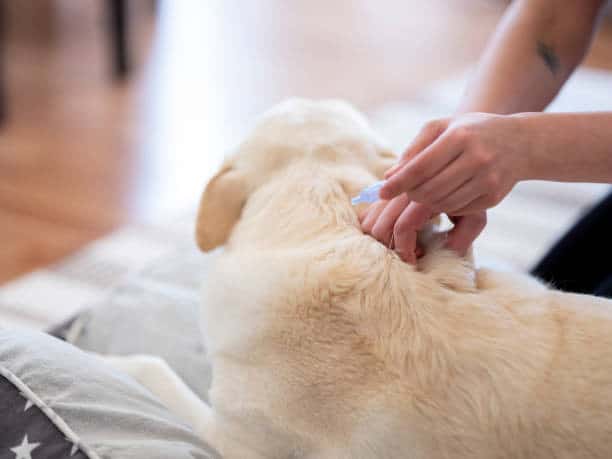
Dental Care
Proper dental care is essential for 6-month-old Labrador puppies. Teeth cleaning should be part of your regular grooming routine, using a soft-bristled toothbrush and dog-safe toothpaste.
Lab puppies start losing their baby teeth around four to five months old, and adult teeth will gradually replace them over the next few months. If you notice any baby teeth remaining after six months, they may need to be extracted by a veterinarian.
Establishing good dental hygiene habits early on can help prevent issues such as gum disease and bad breath in the future. Regular veterinary exams can also detect dental problems before they become more serious.
Handling Common Behavior Problems
With simple training techniques, you can learn how to manage and correct common behavior problems such as chewing, jumping up, and overexcitement in your 6-month-old Labrador puppy.
Chewing And Teething In New Pup
Chewing and teething are two common behavior issues that Labrador Retriever owners may face when raising a six-month-old pup. At this stage, puppies’ baby teeth typically become loose and fall out to make room for their adult teeth.
This can result in uncomfortable sensations, leading your puppy to chew on anything it can find. To manage this issue, give your puppy plenty of chewing toys and bones to redirect their desire to chew away from household items.
Additionally, monitoring the progress of your pup’s teething is critical since there may be some issues with the baby teeth not being pushed out correctly by the adult teeth.
Jumping Up In Most Dogs
Jumping up is one of the most common issues Labrador owners face with their puppies. While it might seem like a cute greeting, jumping up can quickly become a problem when the puppy reaches adult size.
Teaching your six-month-old Lab proper greetings from an early age is essential to prevent this behavior. Consistency is key. If you give in even once, you’re undoing your hard work and allowing your pup to jump up for attention or petting.
A proactive approach to preventing jumping before it occurs is teaching your dog impulse control through obedience training, discussed more thoroughly in our article above under “training.”
Over Excitement In Many Puppies
Labrador retrievers are known for their high energy and enthusiasm, but it is important to train them to control their excitement. Without proper training, they may exhibit behaviors like jumping up on people, nipping, or biting when playing too roughly.
Another way of managing over-excitement is by keeping close supervision during playtime and stepping in when the situation gets out of hand. Encouraging calm behavior while providing plenty of physical activity can help prevent excessive energy buildup that often leads to over-excited behavior.
Crate Training To Make The Best Dog
Crate training is useful for many aspects of puppy care, from house training to preventing destructive chewing and separation anxiety. Here are some important things to keep in mind when crate training your 6-month-old Labrador puppy:
- Choose the right size crate – it should be big enough for your puppy to stand up, turn around and lie down comfortably, but not so big that they can use one end as a bathroom area.
- Introduce the crate gradually, starting with short periods while you’re home and gradually building up to longer periods and eventually leaving them alone in the crate.
- Use positive reinforcement methods like treats and praise to encourage your puppy to enter the crate willingly.
- Never use the crate as punishment or confinement for long periods.
- Don’t let your puppy out of the crate if it is whining or barking—wait until it is quiet before letting it out.
- Provide appropriate toys and chews inside the crate to keep your pup occupied.
Neutering And Spaying For Lab Puppy’s Growth
Benefits And Risks
As a responsible Labrador owner, you’d understand the benefits and risks of neutering and spaying your 6-month-old Lab. Here’s a breakdown of the pros and cons to help you make an informed decision.
| Benefits | Risks |
|---|---|
| Prevents unwanted litters | Increased risk of joint problems |
| Reduces risk of certain health issues, such as certain cancers | Increased risk of obesity |
| Can reduce aggression and territorial marking | Potential impact on growth and development |
| Helps control the pet population | Increased risk of certain cancers |
Before making a final decision, consult a veterinarian to discuss these factors and determine the best timing for neutering or spaying your Labrador. Also, consider alternative options like hormone-sparing or non-surgical sterilization, which may suit your pup.
Remember, proper nutrition, healthy weight management, and regular check-ups with a veterinarian are essential for maintaining the health of your neutered or spayed Labrador.
Timing For Your Labrador
Timing is crucial when considering neutering or spaying your Labrador. Sexual maturity in this breed can occur as early as seven months or as late as 22 months. Before deciding, it is important to review the pros and cons of neutering with the breeder and veterinarian.
Labrador Retrievers should also have shorter leash walks until they are six months old. This allows their bodies to develop properly without putting too much strain on their joints.
Safety Tips For Your 6-Month-Old Dog
Teaching safety cues, leash training, and proper playtime are essential safety tips for your six-month-old Labrador puppy.
Teaching Safety Cues At Young Age
Labrador puppies can be very curious and adventurous, but it’s important to teach them safety cues to prevent accidents or harm. Here are some safety cues to teach your 6-month-old Labrador puppy:
- “Leave it” command – Teach your puppy to leave potentially harmful objects or substances alone.
- “Wait” command – Teach your puppy to wait before crossing a street or entering a dangerous situation.
- “Stay close” cue – Encourage your puppy to stay close when walking in busy areas or around other animals.
- Recall training – Train your puppy to return to you quickly when called, even in distracting situations.
- “Watch me” cue – Teach your puppy to look at you on command, which can help redirect attention away from potential hazards.
Teaching these safety cues can help keep your Labrador puppy safe and reduce the risk of accidents or injuries.
Leash Training For Chocolate Labs
Leash training is an essential skill for lab puppies to learn, as it ensures their safety and makes walks and outdoor activities more enjoyable for both the dog and the owner.
Starting with a shorter leash and gradually increasing its length can help acclimate puppies to being on a leash while preventing them from getting too far away or getting into dangerous situations.
Gradually increasing the distance of leash walks is crucial until lab puppies reach six months old. Running or jogging should still be avoided at this stage to avoid damage to young dogs’ growth plates.
Limiting distractions during training sessions by finding quiet areas can help build focus and attention skills in lab puppies, making future outdoor adventures more manageable.
Proper Playtime for Your Dogs
Playtime is essential to a 6-month-old Labrador puppy’s growth and development. However, it is crucial to ensure playtime is safe for your pup. Avoid roughhousing or wrestling games that may lead to injuries or teach aggressive behavior.
Also, remember to incorporate short training sessions into playtime to reinforce obedience commands already learned while simultaneously stimulating mental activity.
Moreover, socializing your Lab puppy during playtime helps them develop social intelligence and relational skills with humans and other dogs over time.
Overall, proper playtime for a 6-month-old Lab involves actively supervising all activities, incorporating training exercises between fun times, and balancing physical activity with rest breaks throughout the day.
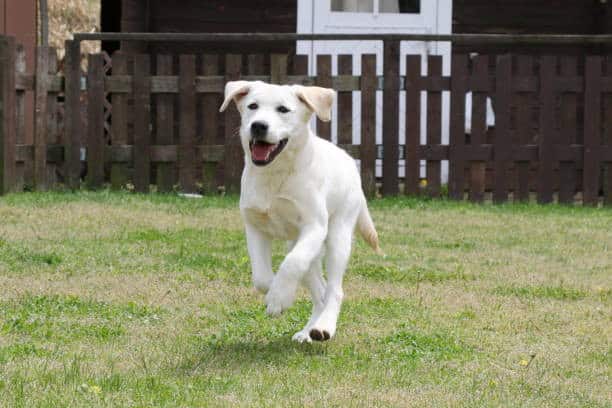
Additional Training Resources For Many Owners
Explore a range of additional resources to help train your 6-month-old Labrador puppy, such as books and videos, professional training classes, and online courses.
Books And Videos For Family Members
If you are looking for additional resources to help with the training, growth, and health care of your 6-month-old Labrador puppy, various books and videos are available. Some recommendations include the following:
- The Labrador Handbook by Pippa Mattinson: This comprehensive guide covers everything from choosing a puppy to advanced obedience training techniques. It also includes feeding, exercise, grooming, and health care information.
- The Happy Puppy Handbook by Pippa Mattinson: This book provides tips on raising a well-behaved and happy puppy. It covers key topics such as socialization, crate training, bite inhibition, and potty training.
- Zak George’s Dog Training Revolution (YouTube channel): This YouTube channel offers a range of videos covering basic obedience training techniques as well as more advanced skills. The videos focus on positive reinforcement methods and provide step-by-step guidance for each exercise.
- Kikopup (YouTube channel): Kikopup’s channel is another great YouTube resource. The videos cover topics such as loose leash walking, recall training, and teaching tricks using positive reinforcement methods.
- Custom Trained Retrievers: If you are interested in professional training services for your Labrador puppy, Custom Trained Retrievers offers customized programs based on your dog’s needs and abilities.
Utilizing these resources alongside the recommendations outlined in this guide ensures that your 6-month-old Labrador receives the best care and training for a healthy and happy life.
Professional Training Classes For Most Dogs
Professional training classes are an excellent way to help your 6-month-old Labrador puppy develop into a well-behaved and obedient adult. Here are some benefits of professional training classes:
- Experienced instructors can guide you through the process of teaching your puppy essential skills, including obedience commands, leash walking, and socialization.
- Classes allow your puppy to interact with other dogs and people in a controlled environment, which can help improve their social skills and reduce any aggressive tendencies.
- Professional trainers use positive reinforcement methods that reward good behavior with rewards or praise instead of punishment.
- Training classes can help owners understand their puppies’ body language, behavior signals, and how to respond correctly.
- Puppies that receive early training tend to be more responsive and adaptable than those that do not receive formal training.
Professional training classes can provide valuable resources for your 6-month-old Labrador puppy and yourself as an owner. Investing time in quality training programs will make your dog successful in the long run. Also you will keep behavior problems at bay.
Online Courses for Working Dogs
Online courses are available which offer additional training resources related to six-month-old Labradors. These courses can provide comprehensive guidance on training, growth, and health care for Lab puppies.
Labrador owners can benefit from the support and resources offered by online forums and other puppy owners. Here are some popular online courses for Labrador puppy training:
- Labrador Handbook
- Puppy Socialization and Early Obedience Course
- Advanced command training course
- Obedience training classes
- Puppy Obedience School
Always do proper research before choosing an online course, as some may need to be more reputable and effective. For optimal results, supplement online courses with professional training classes and consultation with a veterinarian.
FAQ
1. How Much Should A 6 Month Old Lab Puppy Eat?
At 6 months, labs need 2-3 cups of high-quality puppy food divided into 2-3 meals per day.
2. How Much Exercise Does A 6 Month Old Lab Need?
Puppies this age need 30-60 minutes of exercise and playtime daily to expend their high energy.
3. What Training Is Needed At This Age?
Continue working on basic obedience, manners, crate training, and house training. Keep training sessions short and positive.
4. What Toys Are Best For A 6 Month Old Lab?
Interactive toys like ropes, balls, and frisbees engage their natural fetch instincts. Also provide chew toys.
5. How Much Do 6 Month Old Labs Sleep?
Labs this age sleep 12-14 hours a day. Enforce naps to avoid over-tired crankiness.
6. Do They Still Chew A Lot At This Age?
Yes, labs teethe until 7 months old so provide plenty of chew toys to save your belongings.
7. When Can They Be Left Alone?
At 6 months, labs can only be left alone for 2-3 hours at a time. Hire a dog walker or use day care for longer absences.
8. How Often Should They Be Groomed?
Brush their coat 1-2 times a week to control shedding and bathe monthly. Trim nails as needed.
9. What Health Concerns Exist At This Age?
Get necessary vaccinations. Monitor for joint issues if puppy is overweight.
10. Are They High-Energy At 6 Months?
Yes, labs are extremely active at this age. Provide lots of play, exercise, training, and affection.
11. How big is a 6-month-old Lab puppy?
A 6-month-old Labrador puppy is between 40 and 55 pounds for males and 30 to 35 pounds for females. However, Labradors have a wide range of normal weights, so it is important to consult your veterinarian to ensure your puppy grows healthy.
12. What to expect from a 6-month-old black lab?
At 6 months old, Labrador puppies are still considered puppies but are starting to enter adolescence. This means they are going through a rapid physical and mental development period.
They may be more independent and willful than they were as younger puppies, and they may start to challenge your authority. However, they are still playful, affectionate, and eager to learn and please you.
13. How much exercise does a 6 month old Lab need?
A 6-month-old Labrador puppy needs at least 30 minutes of exercise per day. This can be split up into two or three walks or playtime sessions. Puppies should not be allowed to run or jump for extended periods, which can stress their developing joints.
14. At what age are Lab puppies fully grown?
Labrador puppies reach their full adult size at around 18 months old. However, they may continue to fill out and mature until they are 2 years old.
15. What age is a Labrador no longer a puppy?
A Labrador is no longer considered a puppy at around 18 months old. However, they may still have puppy-like behaviors, such as chewing or excessive energy, until they are 2 years old.
Author Profile
- Site Owner And Dog Lover
-
Aritra, the founder of Labradorandyou.com, is a lifelong dog lover whose passion ignited for Labradors for their loyalty and intelligence. With extensive research and personal experiences, Aritra has become a Labrador expert, offering a rich resource on the breed. Labradorandyou.com provides reliable, timely, and evidence-based information, including Labrador-specific product reviews, training techniques, and care tips.
Labradorandyou.com was born out of Aritra's passion and his desire to share his profound knowledge about the breed. The site serves as a comprehensive resource, offering a wealth of up-to-date information for Labrador owners and enthusiasts alike
Also by the author
-
 Lab-TypesNovember 17, 2023Old Dog Seizures: Causes, Symptoms, and Treatment Options
Lab-TypesNovember 17, 2023Old Dog Seizures: Causes, Symptoms, and Treatment Options
-
 Lab-TypesNovember 17, 2023Why Is My Dogs Poop Yellow? 8 Reasons & Solutions
Lab-TypesNovember 17, 2023Why Is My Dogs Poop Yellow? 8 Reasons & Solutions
-
 ReviewsNovember 17, 2023The Only Hill’s Science Diet Review You Need To Read
ReviewsNovember 17, 2023The Only Hill’s Science Diet Review You Need To Read
-
 Lab-TypesNovember 17, 2023How To Adopt An Emotional Support Dog?
Lab-TypesNovember 17, 2023How To Adopt An Emotional Support Dog?
